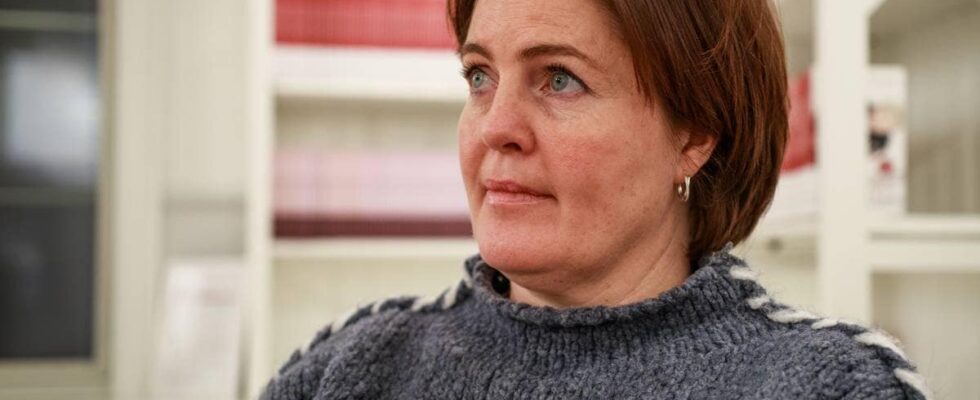– There is no follow-up, and no care by us. This is how comedian and author Dora Thorhallsdottir describes what it is like to be a relative. Two years ago, her husband removed a cancerous tumor in his throat, and lost the ability to speak and eat normally. Afterwards, they missed information on how to adapt to the new everyday life. – It feels as if we are the first in the world who have ever experienced an operation and then being sent home, because there is no one to lean on, she says. Recently, she wrote a longer post on Facebook about how both she and her husband have experienced the time after he was discharged from the hospital. Dora Thorhallsdottir points to three things they have missed after her husband’s operation: follow-up of mental health, information and sharing of experiences, and that hospitals communicate better. Photo: Lykke Frida Synnøve Høyås / news “For my part, it has also been terrifying to be responsible for my husband, who at times has not been able to breathe because of mucus stuck in the hole he breathes through in his throat. I have stood several times, in the middle of the night, with tweezers in his throat, when he has not been able to breathe. Knowing that if I don’t get this done very quickly, well, he could die.” she writes. Thorallsdottir emphasizes that she has no relevant education or training to do these things. – Do we have a health system that is only concerned with operating? And which throws people into new life situations that are quite intense and quite tough? she asks. – Feels like a hair in the soup Unn Birkeland is general manager of the Pårørendesenteret foundation. She says that they meet many relatives with similar experiences as Thorhallsdottir. Figures from the Pårørendealliansen show that at any given time there are approximately 800,000 people in Norway who are in various types of relatives relationships with other people. – People say that they feel like hair in the soup, that they are troublesome, that they have to take on tasks for which they are not trained or schooled, and for which they may in the next instance also feel they have to take responsibility for if things go wrong , she says. Unn Birkeland is the general manager of the Pårørendesenteret foundation. Photo: Kaj Hjertenes / news – It is precisely these things that make it difficult. The fact that one does not experience mastery leads to psychological challenges, that one is often unable to stand in working life, or even if there are children and young people who experience this – that they are not able to stand in their schooling. Birkeland says that they experience on a daily basis that relatives have not known about the help services available. – They exist. But, unfortunately, when there is no systematic training of those who carry out professional work and meet relatives, and there is also no systematic sharing of such information, then there are many people who never find out about it. Relatives are not included On 4 June, Ukom published a report on how relatives have become involved in decisions before serious incidents have occurred in the health service. – The role of relatives is underestimated and is not sufficiently valued. Relatives provide important information to the treatment apparatus, and their knowledge can help prevent serious incidents, says Ukom’s director Pål Iden, in a press release. Several surveys they have carried out also show that relatives do not experience being looked after in the aftermath of serious incidents. – None of the businesses that have been involved in serious incidents that Ukom has investigated had included the next of kin in learning and improvement work. Ukom’s new report summarizes how relatives experience this, says Iden. Pål Iden is director of the National Commission of Inquiry for the Health and Care Service (Ukom). Photo: Arild Eskeland / news Working with a better offer Health policy spokesperson in the Labor Party, Truls Vasvik, admits that relatives are not well enough cared for, but says that a better solution is on the way. – In the Hurdal platform, which is currently being worked on, there is something we have called next-of-kin agreements with the municipality, where the municipality must offer the next-of-kin an offer. It is just around the corner, and is a standardisation, so we know that this will be quite the same throughout the country. – We shall make the leave rights of relatives better known. We will do a better job of creating information material about both the offers in the municipalities and what is available in general, he says. Health policy spokesperson in the Labor Party, Truls Vasvik. Photo: Gunnar Grindstein / news Relatives believe they are an invaluable resource Recently, the Ministry of Health and Care presented the National Health and Cooperation Plan from this year to 2027. In it, the efforts of relatives are described as follows: “Care provided by relatives is often referred to as informal care work , work that is estimated to encompass almost the same magnitude as that carried out by the municipal care services measured in the number of man-years in Norway. Society’s care provision would probably break down if informal care disappeared or was greatly reduced.” Vasvik says relatives are an invaluable resource, which must be used with great care. – We as a society are dependent on relatives, but it should not be the case that relatives are the new welfare state. Our joint health service will take care of it, but we have to play as a team with relatives, he says. – If we don’t do that, we risk that those who are next of kin eventually become ill themselves, and then there is a double crisis. Published 04/07/2024, at 21.18
ttn-69
– No one to lean on – news Trøndelag – Local news, TV and radio

